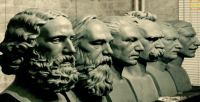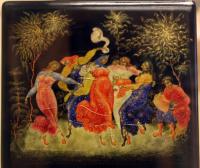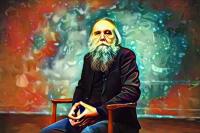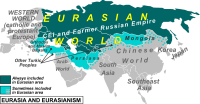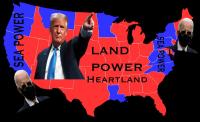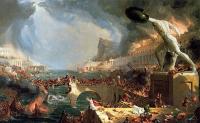Alexander Dugin’s Neo-Eurasianism and the Eurasian Union Project:
The day after Vladimir Putin announced the goal of establishing a Eurasian Union between the Russian Federation, Belarus, and Kazakhstan, an important article appeared in the Financial Times.[1] In that article, Charles Clover asserted that Putin’s announcement marked “the epitome” of the ambitions of “a small group of committed ‘Eurasianists,’” Alexander Dugin foremost among them. According to Clover, Dugin, head of the International Eurasianist Movement, even took credit for most of the content of Putin’s announcement at a conference at the University of Moscow the day the announcement came out, claiming to have helped in its preparation. [2] Before leaving the topic of Dugin’s influence on Putin’s Eurasian Union project, Clover recalls John Maynard Keynes’s acute remark that “madmen in authority, who hear voices in the air, are distilling their frenzy from some academic scribbler of a few years back.” In this paper, I argue that a comprehensive analysis of the proposed Eurasian Union and its underlying political theory must pay more attention to the recent writings of the “academic scribbler” Alexander Dugin, the leading theorist of Eurasianism.[3]
Order and Chaos: the pillars of sacred geography
Order and Chaos are fundamental structures and constitute a pivotal nexus of reality as a whole. These concepts can thus be understood as consistent poles of the basic dynamic that characterizes and produces life, movement and relation themselves: without the connection between Order (the fixed, constant коород, that ensures the ontological and epistemic stability of the Unus Mundus) and Chaos (the pre-formal energetic dimension from which everything derives and toward which everything comes back, in a dynamic, dialectical and polemological process)[1] nothing could be properly understood — and even before that, nothing could appear in the domain of visibility, in the reign of the “clearing”, the Lichtung, to adopt Heideggerian language (Di Somma, 2017; Chai, 2014). As can be seen, Order and Chaos have a significant religious, symbolic and metaphysical core, which originally connotes these concepts through their cosmogonical and theological origin which is later acquired, discussed and embodied within philosophical speculation.
GREAT AWAKENING: THE FUTURE STARTS NOW
The real struggle begins just now. The fear Democrats felt during peaceful protests on Capitol hill will be reminder for all of them. Seeing simple American people – dispossessed majority, silent and “deplorable” – coming to Congress – that was the moment of truth. And deputies have hidden themselves under banks... Real “deplorables” are these cowards. They grasped in this marvellous moment that they are no more safe anywhere. Welcome into our skin. From now on Democrats will be attacked worldwide. They should know: we observe them exactly as they do; we will follow them exactly as they do; we will gather information and create the dossiers on all Democrats, globalists and their puppets exactly as they do. From now on any connection with Democrats and their proxies will be considered as the fact of collaborationism and of participation in the crime against humanity. They killed thousands and hundreds of thousands outside of USA. But the evil doesn’t recognize the limits. It is always based on hybris. So they started to kill American themselves. Ashley Babbitt is just the beginning. They are planning the real genocide inside US this time. And that has already began.
IRAN AND THE FULFILLMENT OF HISTORY
We need to refresh his mission, to reestablish the real dimension of the Iranian Call (da‘wah) for universal Revolution. And that concerns everybody on the planet, every entity in the whole cosmic structure. It is a call for men, women, animals, plants, elements, for angels and demons. It is the call for the Great Zuhur, and we need to reopen this hidden dimension of the Iranian Revolution.
I consider that a sign of the Great Awakening – not only for Muslims - that was addressed to all of us. But each culture should find the proper way to translate this Call (da‘wah). It is not just about literal translation – to translate the Call (da‘wah) is not the same as to translate a text. We need to translate the Iranian Revolution as the Event (Ereignis) in Heideggerian sense. So, we have the Event but we still need its correct interpretation.
“Wozu Philosophen in dürftiger Zeit?”: A Philosophical Clearing with Alexander Dugin
The New Beginning requires a complete renovation of all the structures and disciplines of thought which have developed since the first one, even, as Heidegger pursued, what it means to Think.
This brings us to the third thesis, which is that, following both Heidegger and the Traditionalists, for the New Beginning we have much to learn from returning to the source, from before the End of the First Beginning to which Philosophy owes its course.
Wozu Philosophen in dürftiger Zeit? Online conference 19.12.2020 (full)
Talk with Russia’s Leading Philosopher Aleksandr Dugin & Dr. Ejaz Akram: Liberal Modernity etc. (Pakistan)
Philosophical conference “Wozu Philosophen in dürftiger Zeit?”
Dear colleagues! We are glad to invite thinkers from all over the world interested in phenomenology, Heidegger, Plato, Post-Modernism, traditionalism, structuralism, anthropology and related subjects as also all unindifferent followers to the philosophical conference “Wozu Philosophen in dürftiger Zeit”? (What are philosophers for in a destitute time?) which will take place on Saturday 19 December at 20:00 Moscow time in Zoom (see timing for different hour zones below).
Noomachia, the Internet and the End of Modernity with Aleksandr Dugin
Wozu Philosophen in dürftiger Zeit? Lecture 1. Radical Subject & his double
In Search of the White Logos
When Daedalus after tragic ordeals at last found firm ground in Cumae, he built Apollo a temple. He hung up his wings as an offering to the god and decorated the golden doors of the temple with his personal story. Aeneas would later reach these doors, and his contemplation of this story served as preparation for his own encounter with Apollo and the founding of Rome. For Apollonian wisdom to be revealed in all its lucidity, it is necessary first to come to terms with the story leading to his temple. Plato needs a Timaeus before the Parmenides, Hegel a Phenomenology of Spirit before the Science of Logic. The major, eternal mysteries need the minor, temporal mysteries, as Apollo needs Dionysus.
Dugin on InfoWar with David Knight (2018)
Donald Trump and the Fourth Political Theory
Traditionalism as a Theory: Sophia, Plato and the Event
Traditionalism is something other than tradition. It is a breakthrough to that which is the tradition of traditions, the secret grain, the theory. But being a theory, a construct, it needs to be continuously recreated. A construct is not so bad if the matter at hand is something rooted in the light nature of man himself. By creating, man creates himself. Therefore, Traditionalism must either happen or disappear. Its claims are too enormous and its bar has been set too high by Guénon and the Sophiologists on whom he constructed his doctrine. “Perennialism” means that Sophia is Perennis: she is here and now. But how can we relate the fact of the Kali Yuga, our God-forsaken “now” and the dustbin of the modern Western-centric global world, our vile, desolate “here”, with the rays of the Angel-Initiator, the light of Great Love, and the nature of man as a winged divine being? The Gnostics offered a dualist answer which often seems to be the only one acceptable and applicable to us. But is this not simply a recognition of our own weakness, of our own personal inability to transform the “Cover” into the “Mirror”, Absence into Presence, apophany into epiphany, and occultation into revelation? Is this not the signature on the warrant for the death of the Logos, the insuperability of Western nihilism, or the recognition of the closed, self-referential world to be the only possible and real?
HORIZON OF THE IDEAL EMPIRE
Women will love the Empire and cherish it every morning in greeting the sun. Morality will change. The word “evil” will be excluded from the lexicon along with all bad expressions. Instead of them will be introduced the gradual concept of “less good.” A less good person stole a bun at the market. He deserves less love and less respect than the one who asked for a bun and was given one. With a gentle smile. Everyone will smile and laugh at funerals, for since this world is so beautiful, what about the next…And then death will be comprehended as a return to the eidos (επιστροφή).
THE RISE OF THE TRADITIONALISTS: HOW A MYSTICAL DOCTRINE IS RESHAPING THE RIGHT
Steve Bannon, Donald Trump’s former chief strategist, returned to the headlines in August, having been arrested on a yacht and charged with defrauding donors to a private campaign to build a wall along the US-Mexico border. Of the $25m collected by the We Build the Wall organisation, Bannon and three partners are accused of diverting more than $1m for personal expenses. At a preliminary hearing, Bannon’s attorney entered a not guilty plea on his behalf. Bannon is often characterised as a “nationalist” and a “populist”, but few realise that he is also affiliated with a much more obscure movement – one stranger and more radical than right-wing populism, and one whose cause is greater than that of a single election, greater, in fact, than politics.
The Battle for the Cosmos in Eurasianist Philosophy
The Eurasianists were never materialists. On this point they found themselves in opposition to the main trends of modern science. At the same time, however, for them it was of importance to not simply affirm the priority of eternal elements and principles – hence the main Eurasianist thesis on ideocracy, the ruling-idea, the rule of ideas – but to insist that the whole world and all of reality, from politics to economics and from religion to science, be permeated with ideas. Petr Savitsky insisted on the concept of “place-development” or “topogenesis” (mestorazvitie). “Place-development” is the conjunction of physical space and the continuity of historical meanings, semantics, and events. Territory is inextricably linked with history, and history, in turn, is a continuity of ideas revealing a single image of monumental eternity that unfolds through humanity and over its spiritual path through time.
GEOPOLITICAL CONSEQUENCES OF UPCOMING AMERICAN ELECTIONS
We could find in that reading and discourse the convergence -- similar meaning with different outer shapes could emphasize the serious divergence, because in the long perspective that means two world orders – realist and liberal. Trump’s line will somehow accept multipolarity as established fact trying to secure the US leading role in multipolar world order, while Biden’s globalism will try to prevent at any price the coming of the multipolar age because that destroys the linear progress of liberal democracy that is now almost “religious” dogma of Democrats and globalists.
Review: Last War of the World-Island by Alexander Dugin
Counter-hegemonic visions of Neo-Eurasianism
Intellectuals and writers of modem Russia with great enthusiasm take care of the search for adequate socio-political explanations of the former gigantic empire, which after the collapse of the Soviet Union was lost and disoriented. At the same time, the universal vacuum was affecting Russia's integral environment due to the fall of the Marxist-Leninist development project. After all this, philosophers and social activist tried to make a foundation to the actual ideological goals of Russian society. However, so far, many of ideological aspirations to create new national policy was unsuccessful.
Since the mid-1990s, theoretical debates about Russia’s role in post-soviet space began with the key concepts of “Eurasia” and “Eurasianism”. The concept of Eurasia has become an integral part of the political discourse in Russia. As a matter of this discourse, the value of this concept appeared numerous presentations and analytical works of publicists, intellectuals, and politicians who are tried to use it to describe the present and future role of Russia in world politics. Today, Eurasianism advocates general turns and ideas of geopolitical and geo-strategic processes which should give an idea about the Russian position in the post-communist world order. In this sense, the concept of Eurasia represents mainly normative category, which is used in the work within the framework of political and ideologically debate about the self-understanding of Russia.
Geopolitics of American elections
These two Americas - the America of the Land and the America of the Sea - have come together today in an irreconcilable struggle for their president. Moreover, both Democrats and Republicans obviously do not intend to recognize the winner if he comes from the opposite camp. Biden is convinced that Trump "has already falsified the election results," and his "friend" Putin has "already intervened in them" with the help of the GRU, Novichok, the Olga trolls and other multipolar ecosystems of "Russian propaganda." Consequently, the Democrats do not intend to recognize Trump's victory. This is not a victory, but a fake.
Almost the same is also considered by the most consistent Republicans. Democrats use illegal methods in the election campaign - in fact, a "color revolution" is taking place in the United States itself, directed against Trump and his administration. And behind it are completely transparent traces of its organizers, one of the main globalists and opponents of Trump George Soros, Bill Gates and other fanatics of the "new democracy", the brightest and most consistent representatives of the American "civilization of the Sea." Therefore, the Republicans are ready to go to the end, especially since the bitterness of the Democrats in the past 4 years against Trump and his appointees is so great that if Biden ends up in the White House, political repression against part of the American establishment - at least against all Trump's appointees - will have unprecedented scope.
OUR EPISTEMOLOGICAL WAR
I simply disdain analytical philosophy and rational positivism and consider materialism individualism and analytical approach to the consciousness as forms of mental disease. I think it is enough to understand why I am called by them “most dangerous philosopher of the world”. And that explains perfectly all cancellings, deplatformings, demonizations, marginalizations, caricaturizations, criminalizations and so on I am victim of. That is what is epistemological warfare. The globalists will lose. Their educational system should be totally overthrown and destroyed. What they promote is pure mental poison. But to deplore the fact is not enough. We should rise up, resist, revolt and fight for each millimeter of epistemological space.
The Belt and Road Initiative: A Eurasian Road
This economic crisis, the fall of general demand, the crash of oil prices and the beginning of a real civil war in the US, represent a clear sign of the end of the western-centred world. It is a double-faced crisis. On one side, we see liberalism as a historical social vision, as a philosophy. It is not only economic liberalism, the defense of free market or political liberal democracy, parliamentarianism and so on. It is also the metaphysical understanding of the nature of humankind as a mass of individuals. For liberalism, the man is equal to the individual. That is the basis of all liberal ideology as well as progress, understood as accumulation of liberty. More and more liberty, more and more progress in the eyes of liberals themselves is just the same as the progress and growth of liberalism. With this growth of liberalism, the West affirmed its own hegemony, its own domination.
Politica Aeterna and the end of globalism
The entire world is now in the hard war against our identities because liberals and globalists and the hegemonic powers in the West have declared the war to all of us. I think, being isolated, Arabs, Muslims, Russians, Europeans suffering from this globalist Africans, people from India, China or Latin America, we are helpless we can’t win because being isolated makes them more powerful. We need to join our efforts, we should not try to impose Russian values on you, Islamic values on us, try to turn to our case China. We need to recognize all the identities, sacred identities and the right of all the people to restore their civilizational sovereignty and that is the main logic of multipolar politics, the main logic of Eurasianism.





